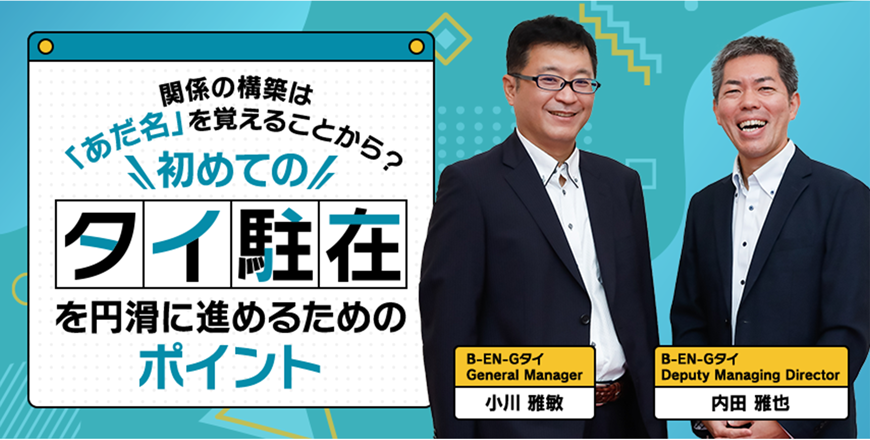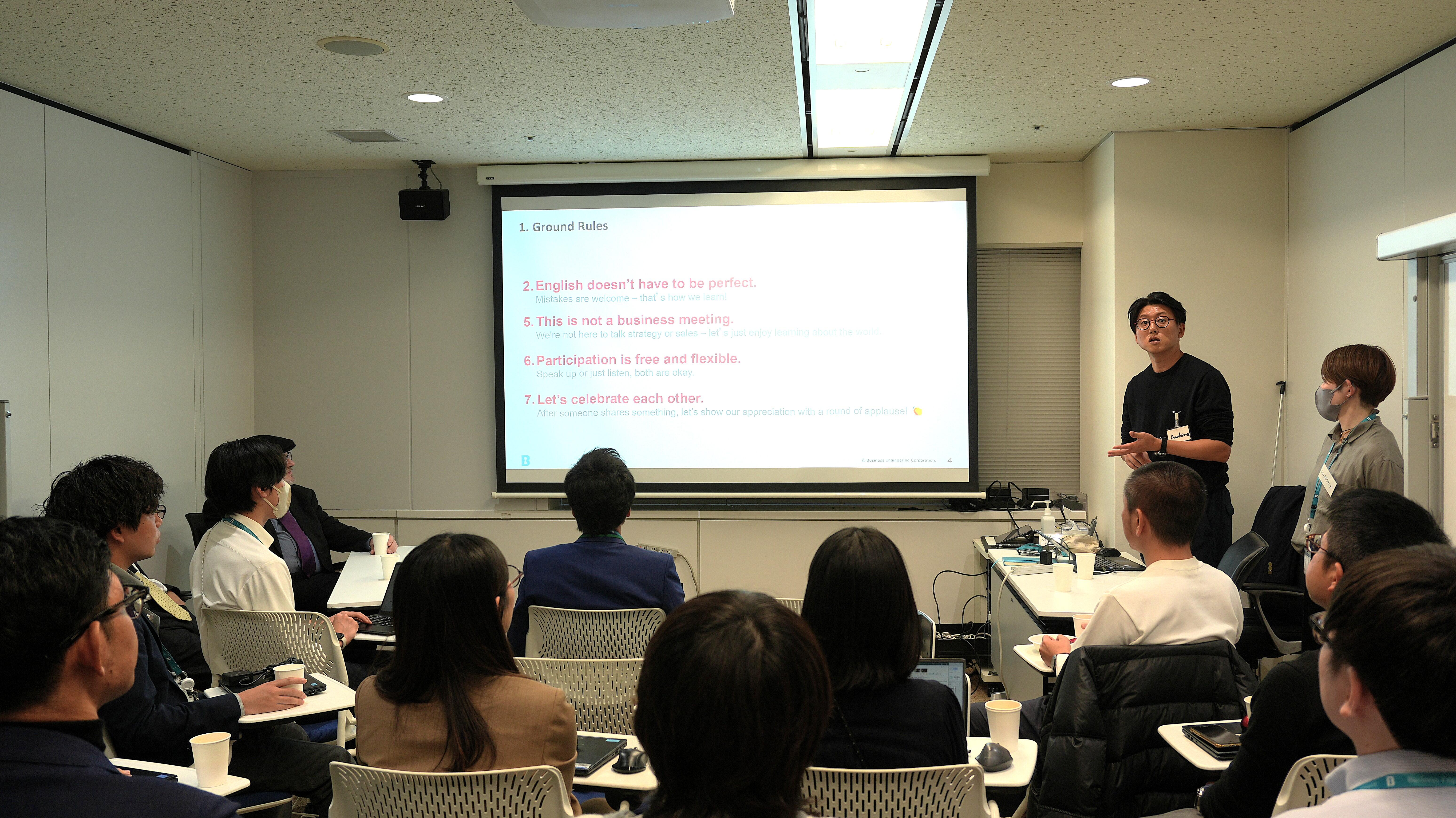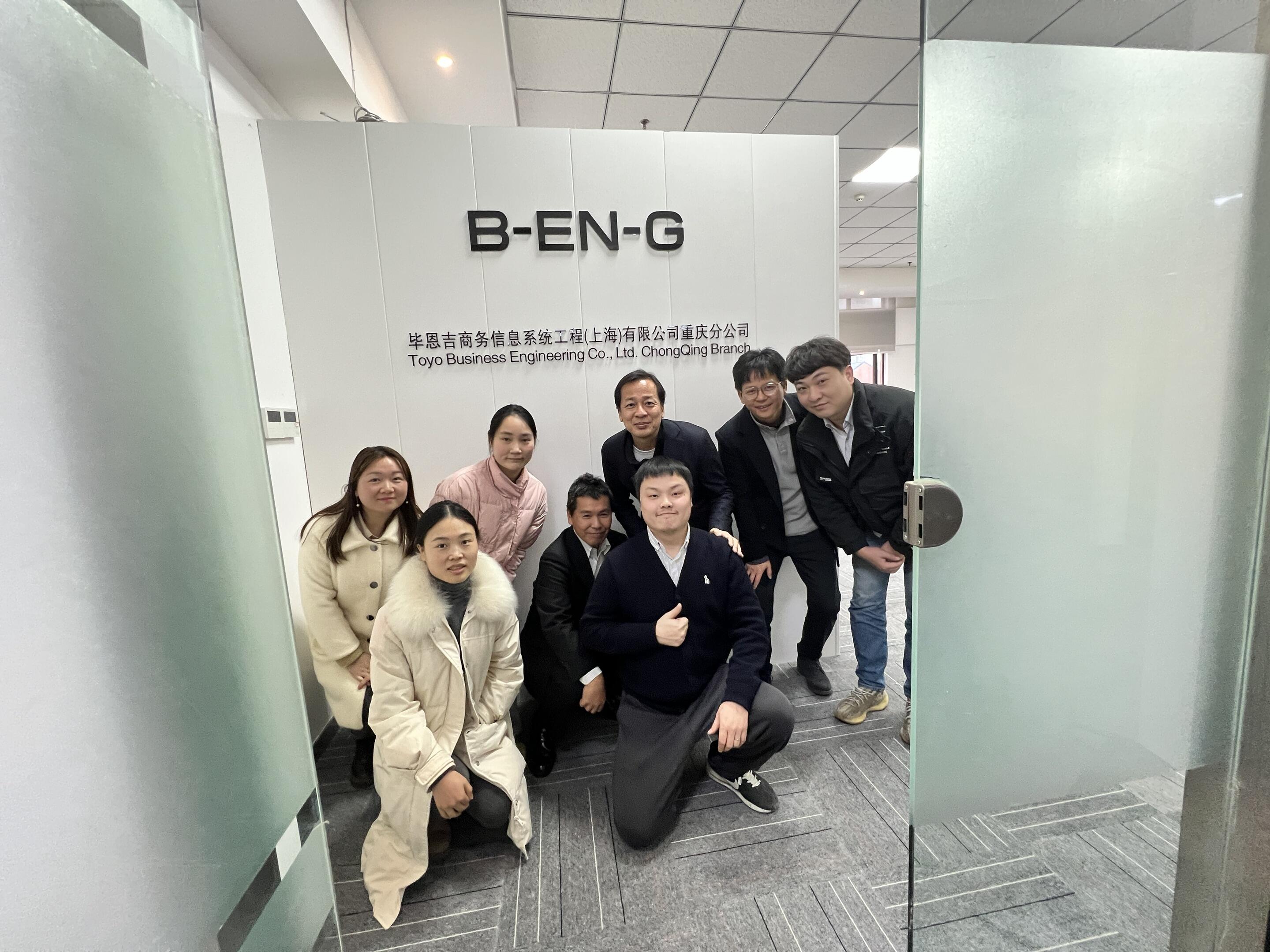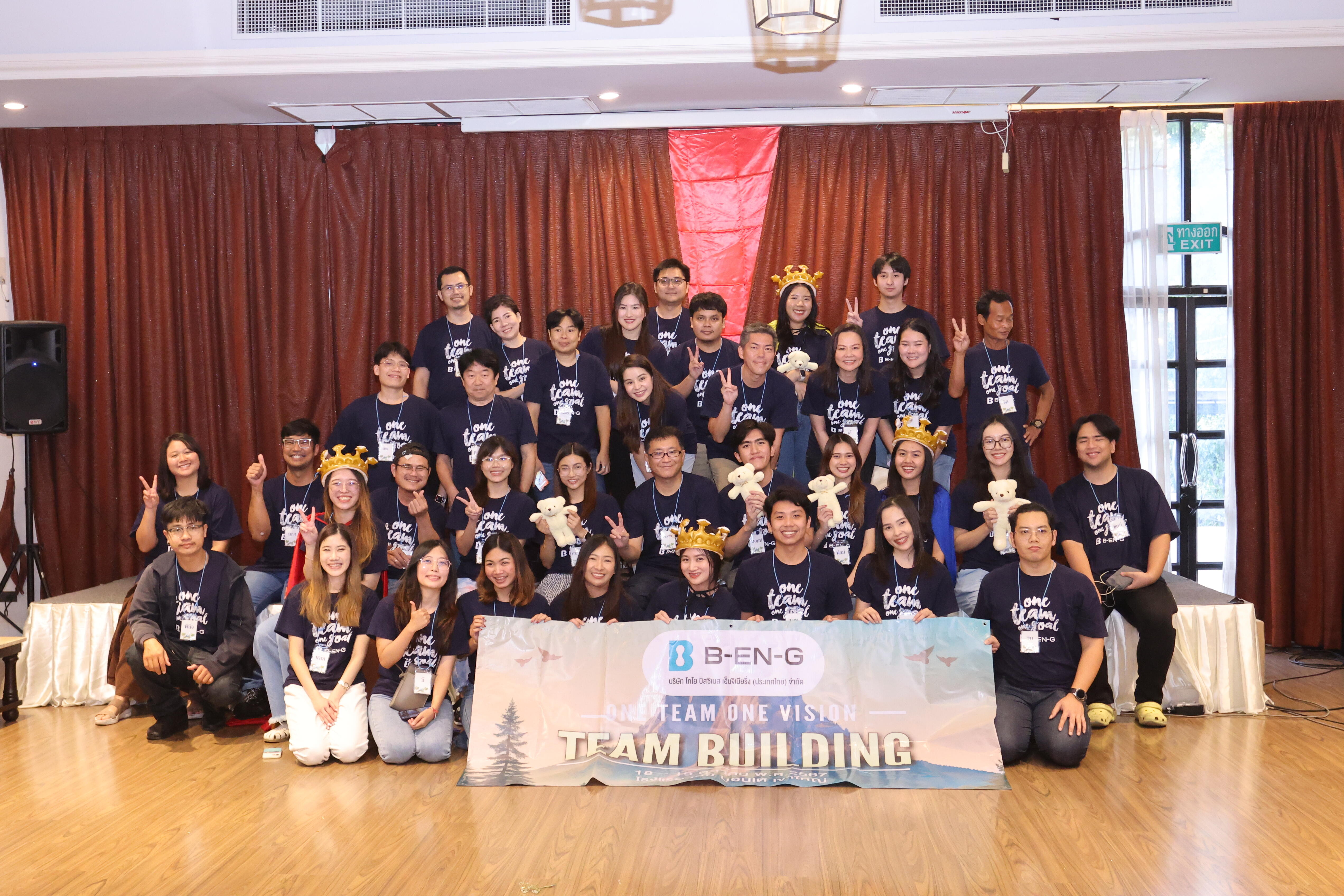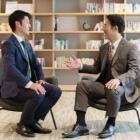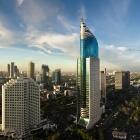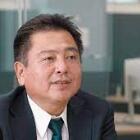When you start working overseas, your work and personal environment will change dramatically. You will be given more discretion and will have to tackle many tasks you have never done before, even though you are not used to them. We spoke to Ogawa, who started his first overseas posting in July 2024 at the Business Engineering (B-EN-G) Group's Thailand base, and Uchida, who was in charge of hosting them there, about their struggles, advice, and the mindset needed for life on an overseas posting.
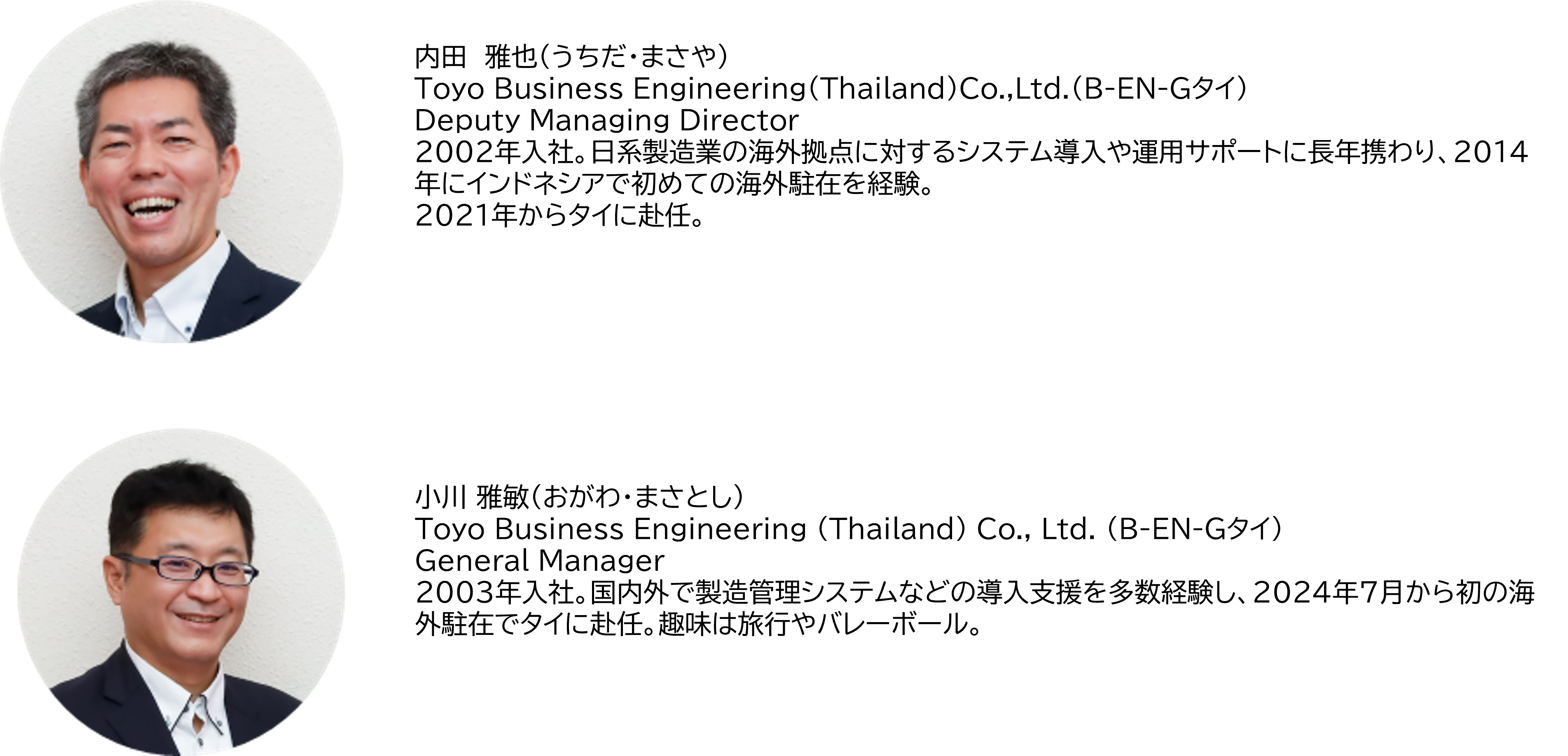
"Can you eat coriander?"
--Mr. Ogawa was assigned to Thailand in 2024. Please tell us about the events that led up to your first posting.
Masatoshi Ogawa (hereinafter, Ogawa): I have always had a dream of working with people from overseas, and even after joining the company, I have worked on many projects to introduce systems to local factories on overseas business trips. After nearly 15 years at the company, I had a clear career aspiration to be stationed overseas, and I had expressed my desire to do so for some time.
I was happy when I was told to be posted to Thailand, among other options such as China, Singapore, and the United States. The first project I was involved in after joining the company as a new graduate was to introduce a system to a Thai factory of a Japanese company, and I stayed there for several months. I felt it was fate.
--But there's a big difference between being on a business trip and being stationed overseas. Did you ever feel anxious?
Ogawa: I consulted with Uchida about various procedures that I had to complete in Japan. If I was going to live and work locally, I would need a work permit in addition to a visa. Since I was going to live there, not just in a hotel, I also had to visit a local real estate agency and look for a house. It took about two and a half months to complete all the procedures.
--Uchida has been working in Thailand since 2021, but did you give any advice to Ogawa when he was posted there?
Masaya Uchida (hereinafter referred to as Uchida): At first, we mainly communicated things like, "You can buy daily necessities here," "Can you eat spicy food?" and "Can you eat coriander?" Since we had both joined the company around the same time, we were able to talk casually.
For people who are being posted abroad for the first time, I think it's important to consider "how much Japanese products you can get." Even with something as simple as sweets, there are some things you can buy and some you can't, depending on the brand. If you don't like Thai food, you can make up for it by taking measures before you move, such as bringing lots of furikake rice seasoning and instant miso soup, so I think I was able to convey that.
Ogawa: In terms of food, when I arrived, Thailand was relatively fortunate. I've always loved Thai food, and there are Japanese restaurants everywhere. So, I didn't have any problems.
--What about the house hunting that you mentioned earlier?
Uchida: My family was with me, and Ogawa-san was alone, so our circumstances were a little different, including the area. Surprisingly, there wasn't much I could give him advice on that.
Mr. Ogawa: At first, I didn't want to take any extra time, so I looked for a place as close to the office as possible. Among them, I found a "service apartment" that offered maid services such as laundry, cleaning, and dishwashing, so I chose that one. They take care of everything for me, so it's very comfortable.
Uchida: I also used a serviced apartment when I was in Indonesia, and I definitely recommend it. I think it's especially suitable for people who are being stationed overseas for the first time. The rent is expensive, but if it helps you concentrate on your work, I feel it's well worth it.
--Were there any other difficulties you encountered when you first arrived?
Ogawa: Due to procedural issues, I had a hard time opening a local bank account. I knew it would take time, so for the first month I brought several hundred thousand yen with me and lived off the cash. At the time, the yen was depreciating, so I felt a chill every time I exchanged money.
It is also important to be "respected" by local staff
--As this is your first overseas posting, have there been any changes in your work duties?
Ogawa: It's completely different. At the headquarters in Japan, I was an engineer who mainly handled other companies' systems such as SAP, but in Thailand, I was suddenly forced to handle our own products such as mcframe. Of course, at overseas bases where manpower is limited, I am required to act not only as an engineer but also as a salesperson. At the same time, as an administrator, I have to do a wide range of work, including back office work such as human resources including recruitment and accounting.
-- It seems like it would be difficult to learn such a wide range of tasks overseas. What were your thoughts as the person accepting them?
Uchida: The first thing I thought was, "Even if we created a business manual, it wouldn't be very meaningful." Our base in Thailand is in the phase of expanding sales, so the work changes every day. We decided that the best thing to do would be to "learn as we go."
On top of that, we made a plan to gradually transfer the work over a three-year period while Ogawa and I were working together. Specifically, in the first year, he would be in charge of sales and system implementation support on-site as a form of "training." From the second year, he would be involved in administrative tasks under my responsibility, and in the third year, Ogawa would take the lead in those tasks. That's the flow. If everything goes according to plan, I'm secretly hoping that in the end, I'll have an easier time (laughs).
--Before welcoming Mr. Ogawa, was there anything you should have done on a regular basis that would have been good?
Uchida: I think it was the systemization of our bases. When I first took up my post, I felt like we were falling behind, so I started introducing a system to manage sales, purchasing, and marketing activities. One of the aims was to make work more efficient, but it also made the work of local staff visible and easier to manage. Although I didn't intend it, it ended up laying the groundwork for a smooth handover of work.
--How did you get used to the job, Mr. Ogawa?
Ogawa: My first priority was to learn the faces and names of the approximately 45 local staff members and their responsibilities. In Thailand, there is a culture of nicknames called "Chuleng," so I spent the first week or so desperately trying to learn their nicknames and faces. Although we all have different real names to use on official documents, employees call each other by their nicknames. I prioritized building relationships with the local staff, and when I had the time, I studied the specifications of our company's products.
--You may be taught how to do your job by local staff. What do you keep in mind when building relationships with them?
Ogawa: Anyway, it's about making it easier to communicate. To the local staff, I'm "someone from outside," so by default, they don't really share their true feelings with me. If there's something bad going on, there's a chance they won't report it. First of all, I aim to have "any information, no matter how bad, shared honestly and in a timely manner."
Of course, it's not good to have an overly casual relationship, so I think we need to have "something to be respected about." Things like making important decisions and knowing the key points of project progress management. The ideal situation would be to build a relationship of trust while drawing out their true feelings, and ultimately support the growth of local staff.
"For the Customer" is the Same
--Is there anything you regret and think, "I should have done this."
Ogawa: Before I was assigned to my new post, I was not able to make sufficient visits to introduce myself to the relevant departments at the headquarters in Japan.
In my case, I was in a position to handle our own company's products for the first time in Thailand, and I had many opportunities to contact the headquarters in Japan regarding specifications and support. There were many issues such as different technical terms and specifications that were significantly different from other companies' products, so I had to be careful when talking to the other party. I feel that if I had at least met face-to-face before leaving the country, the communication would have been much smoother.
Of course, I was really busy with work right up until the last minute, and I did what I could. But later on, I found myself thinking, "I should have met them." It might have been better if the company had been considerate enough to let me take on a dual role for a month or accompany them on sales calls.
--Listening to your story, I get the sense that in addition to living abroad, it must be difficult to also have to learn the job.
Ogawa: When you are posted overseas, your authority and discretion are significantly greater, which can be difficult, but you can also take on new challenges in new areas, including back office work, that you would not have been involved in in Japan, and you feel like you have more experience. There is pressure, but I'm sure it's a positive thing for your career.
On the other hand, our goals of "doing something beneficial for our customers" and "making the people we work with happy" are the same as in Japan. We want our customers and local staff to grow through their work. When I understand things, I try not to waver from that idea.
Uchida: Living abroad can be difficult, but on the flip side, it also means that opportunities are everywhere. I think the question is whether you can enjoy it in a positive way. As a "foreigner," it's important not only to blend into the local community, but also to be proactive enough to sometimes expand your interactions with Westerners in Thailand.
--Do you have any tips for doing your job smoothly after being posted overseas?
Ogawa: It is important to research "things you need to do in Japan" and "things you need to do locally" such as official procedures and get them done as soon as possible. If you are worried about "when is the deadline for that application?", you will not be able to concentrate on your work.
In terms of mindset, it's important not to take for granted what you take for granted. When you work abroad, your common sense is often overturned. You'll be spending time with people who grew up in completely different environments, so if you rely on your common sense, things won't go well.
-Do you have any aspirations for your future life as an expatriate in Thailand?
Uchida: In the context of our "ITization of the BtoB industry," Thailand is a market with a lot of room for growth. There are many sites where the system has been introduced but is not being used. With room for growth, we want to work hard every year to expand our business.
Also, when I leave and Ogawa-san takes over, I want him to destroy everything. I want him to reject the previous leader's path and make the local staff think, "When the top changes, the organization changes." I think that's important. It's also an opportunity to bring out potential. It's boring to just "take over," so I want him to make bold moves.
Ogawa: It's a little difficult to talk about when you say "destruction" (laughs), but I think I understand what Uchida-san wants to say. B-EN-G Thailand has been in business for 20 years, counting from its predecessor, and as a company, it is in the growth to maturity stage. If we do not make some changes while expanding the business, it may head towards a period of decline. I want to remember to take on bold challenges so that when I leave, the company will be able to show that it is "still on the road to growth."
(Text: Kyodo News Digital)
*This article is current as of February 2025.
